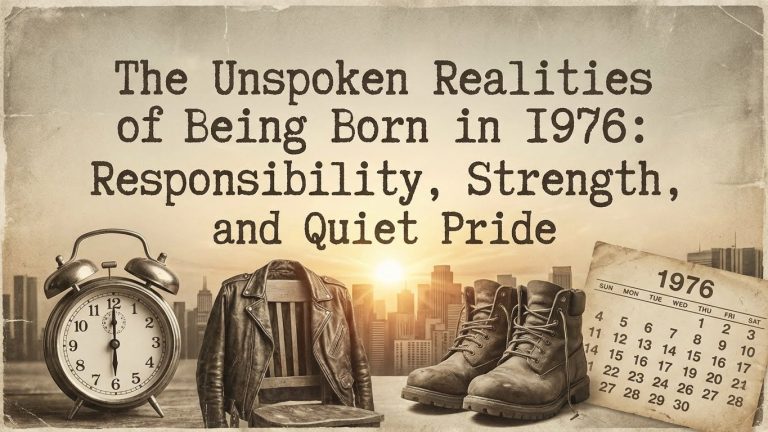It’s not your thoughts. It’s what’s beneath them.
Why You’re Not Moving Forward (And It’s Not Because You Think Too Much)
You’ve read the self-help books. You’ve tried journaling, mindfulness, thinking positive, overanalyzing every scenario until 2 AM.
And yet — you’re stuck.
Most people blame overthinking for their inaction. It’s the villain we love to hate.
“I overthink everything.”
“My mind won’t shut off.”
“I just need to stop overthinking and I’ll finally do the thing.”
But here’s the uncomfortable truth:
Overthinking isn’t the real problem. It’s the surface symptom of something deeper.
In this article, we’ll explore what’s really holding you back — and how to work through it so you can finally take action.
Part 1: Overthinking Is Not the Root — It’s the Reaction
Overthinking feels like the problem because it’s loud. It keeps you awake. It drains your energy. It delays your decisions. But overthinking is a defense mechanism.
It’s not the root cause. It’s what your brain does to avoid:
- Fear
- Uncertainty
- Vulnerability
- Shame
- Emotional risk
We don’t overthink because we’re thoughtful.
We overthink because we’re afraid to feel or afraid to act.
Part 2: What’s Really Holding You Back (The Deeper Blocks)
Let’s go beneath the noise. Here’s what overthinking often masks:
😨 1. Fear of Failure
You obsess over the perfect plan, perfect timing, perfect conditions. But what’s underneath that?
“If I try and fail, what does that say about me?”
This fear is primal. Failure — especially public failure — feels like social death to the brain. So instead of risking it, your mind creates an illusion of progress: endless preparation.
But preparation isn’t the problem.
Perfectionism is a shield.
💔 2. Fear of Rejection
You replay that text 10 times. You write an email and delete it. You rehearse a conversation in your head all week. Why?
“If I put myself out there, I might be judged, laughed at, or abandoned.”
We don’t overthink when we’re alone on an island. We overthink because we imagine how others will perceive us.
The real block isn’t mental.
It’s emotional exposure.
🤯 3. Fear of Identity Shift
Starting something new (a business, a relationship, a new habit) means letting go of the old version of you. And that feels threatening.
“Who will I be if I succeed? What will change?”
Overthinking is the brain’s way of staying in the known — even if the known is painful.
This fear hides behind analysis. But it’s really about identity, not logic.
😶 4. Fear of Feeling
You think you’re stuck because you’re indecisive.
But often, you’re stuck because you’re avoiding a feeling you don’t want to feel:
- Disappointment
- Grief
- Embarrassment
- Guilt
So instead of acting, you think. You loop. You delay.
Why? Because feeling something hard feels worse than doing nothing at all.
Part 3: How to Know If You’re Overthinking or Emotionally Avoiding
Here’s a key distinction:
| Behavior | Surface Symptom | Root Cause |
|---|---|---|
| Obsessing over decisions | Overthinking | Fear of making the wrong move |
| Replaying conversations | Overthinking | Fear of judgment or rejection |
| Constant procrastination | Overthinking | Fear of failure or loss of control |
| Struggling to start anything new | Overthinking | Identity fear or fear of change |
| Needing constant reassurance | Overthinking | Low self-worth or fear of abandonment |
Ask yourself:
What feeling am I avoiding right now?
That question cuts through the mental fog.
Part 4: What Actually Works – Tools to Break Through the Real Blocks
Once you understand that overthinking is just a symptom, you can stop fighting it — and start addressing what’s beneath it.
Here’s how:
🎯 1. Name the Fear Directly
The brain loves to stay vague. Vagueness keeps fear alive.
Instead of thinking “I’m overwhelmed,” ask:
- What am I afraid will happen if I take action?
- What’s the worst-case scenario — and could I handle it?
- Is this about failure, rejection, or shame?
Clarity kills fear’s power.
You can’t conquer what you won’t confront.
✍️ 2. Use “Fear-Based Journaling”
Instead of journaling your thoughts, journal your fears.
Prompt:
“If I take action on ___, I’m afraid that…”
Write freely. Get raw. Don’t self-censor.
You’ll often find that 80% of your overthinking disappears when the fear is seen, named, and met — not ignored.
🧠 3. Retrain the Thought Pattern (Not Just the Thought)
Telling yourself “stop overthinking” is like telling a drowning person “just breathe.”
Instead:
- Catch the trigger (e.g., decision-making)
- Pause and ask: “What’s the fear behind this?”
- Label the pattern out loud: “This is fear of judgment.”
- Redirect with action: “What’s one tiny step I can take anyway?”
This builds emotional tolerance — not just intellectual clarity.
💬 4. Talk to Someone — But Not Just Anyone
You don’t need someone to tell you what to do.
You need someone to reflect your courage back to you.
That could be:
- A coach
- A therapist
- A brutally honest friend
Verbalizing your fears in a safe space disarms them.
🔁 5. Expose Yourself to Emotional Discomfort — On Purpose
If your core block is emotional avoidance, the solution is emotional exposure.
Start small:
- Post something online without editing 10 times
- Speak up in a meeting
- Send the pitch, even if you feel shaky
You don’t need to feel ready.
You just need to feel willing.
Let your body learn: “I can survive discomfort.”
Part 5: Let’s Get Real — A Thought Experiment
Imagine this:
You’re stuck on a decision. You’ve thought it through 50 times. You’ve made 3 pros/cons lists. You’ve asked 4 friends. And you’re still paralyzed.
Now — pause.
Ask yourself:
If I had zero fear — what would I do?
That answer? That’s not your “impulse.” That’s your clarity under all the mental noise.
Most people already know what to do.
They’re just afraid to feel what comes next.
Part 6: Letting Go of the Label — You’re Not “An Overthinker”
We often say things like:
- “I’m just an overthinker.”
- “I can’t help it — it’s how I am.”
But that identity becomes a trap.
You’re not an overthinker. You’re a person who learned, for very good reasons, to stay safe by staying in your head.
And you can unlearn that.
You can learn to feel instead of fear.
Act instead of analyze.
Decide instead of delay.
Overthinking isn’t your personality.
It’s a pattern.
And patterns can change.
Conclusion: You Don’t Need More Thinking — You Need More Courage
You don’t have a “thinking” problem.
You have a fear problem that your brain has been trying to solve through thought.
The solution isn’t to think harder or smarter.
It’s to feel braver.
Ask yourself:
- What am I afraid of?
- Can I let myself feel that — without running?
- What would I do if I trusted myself?
Because the life you want doesn’t lie on the other side of more thought.
It lies on the other side of doing it anyway — even while afraid.











